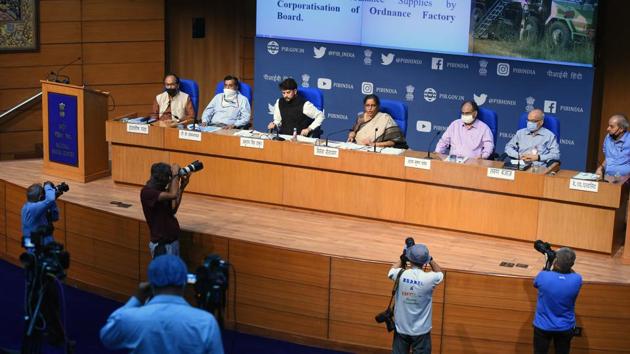Govt unveils reforms to boost Covid-19-hit economy
The government has however sidestepped some equally critical short-term needs, like income support for lockdown-induced joblessness.
In 1991, former PM Manmohan Singh, forced by a crushing balance-of-payments problem, liberalized the Indian economy. Nearly three decades later, the Narendra Modi government has seized the Covid-19 crisis to “unshackle” critical sectors, promising ample privatization of new sectors along with deeper reforms for long-term goals not entirely related to the Covid-19 catastrophe, economists have said.

From agriculture to small industry to mining to defence production, the reforms span several sectors. Experts have termed some of them, radical.
The government has however sidestepped some equally critical short-term needs, like income support for lockdown-induced joblessness, analysts say.
On May 12, Modi announced a Rs 20-lakh crore economic package, equivalent to 10% of India’s gross domestic product or GDP. He branded it “Atma Nirbhar Bharat” (Self-Reliant India) scheme.
The specifics of it, are being announced by finance minister Nirmala Sitharaman in a series of daily briefings. Her last announcements are scheduled for May 17.
“All of these reforms are also to attract foreign investment due to changing global realities. That’s the rubric,” said S. Mahendra Dev, vice-chancellor of the Indira Gandhi Institute of Development Research, Mumbai. Dev formerly headed a federal body that fixes farm minimum support prices.
On Saturday, Sitharaman, devoted her third round of announcements to what she termed as “major reforms”.
“The announcements have nothing to do with a Rs 20-lakh-crore stimulus. These are structural changes. They aimed to give the economy new breathing space,” NR Bhanumurthy of the National Institute of Public Finance and Policy, a leading state-run think-tank said.
These reforms may have been necessitated as much by global factors, Dev said. Global firms are reducing their dependence on China, shifting supply chains away.
“It is true that last few years have been bad for globalization,” said DK Joshi, the chief economist of Crisil Ltd, a ratings firm. The US-China trade war has rewired some supply lines already. Countries are unsure to what extent they can depend on others in a post-pandemic world.
Bhanumurthy said short-term goals are critical too. “People have lost incomes. They need support. Such issues can also make the economy so weak it may not be able to absorb the measures.”
The government pushed key reforms in the “factor markets”, which roughly denote five economic determinants: land, labour, capital, technology and infrastructure.
Before Covid-19 struck on Jan 30, growth was already tumbling. GDP, the broadest measure of people’s incomes, grew just 4.71% in the October-December 2019 period, the slowest pace in six years. “So, it is true that factor-market reforms were required,” Bhanumurthy said.
The reforms also cover sectors that can have multiplier effects on investments, Dev said. Multiplier effects refer to a rippling impact of economic decisions across sectors or society.
In her first round, Sitharaman dealt with small enterprises, which employ the largest number of skilled workforce outside agriculture in India. She hiked the turnover limits of small, medium and micro enterprises (MSMEs) such that they will legally remain MSMEs even if they grew in size. This enables them to enjoy tax benefits, among other rebates.
The foreign direct investment bar in defence will be raised to 74% from 49% to boost the military infrastructure industry. Farmers will be able to sell to any buyer of choice, with the finance minister announcing the end of monopolies of agricultural produce market committees.
Mining firms can now do all of these simultaneously: explore, processing and producing finished useable minerals. The 60% airspace limit for civil aviation will be widened to boost aviation, cut oil imports and shorten flying routes. Sitharaman also announced the end of Coal India Limited’s monopoly, allowing free private extraction on revenue-sharing basis.
The Covid crisis has given the government political legroom to display its reforms appetite, says KK Kailash, who teaches at Hyderabad University.
A key social-sector reform is the digitized ration distribution system branded “One Nation, One Ration Card”, currently under trial in 12 states, which will be made fully operational by March 2021. This will ensure benefits move with migrants, creating constant food security coverage.
“Generally because of Covid and other reasons, countries are thinking of self-sufficiency and India seems to have taken the cue,” Dev said.
Stay informed on Business News, TCS Q4 Results Live along with Gold Rates Today, India News and other related updates on Hindustan Times Website and APPs




